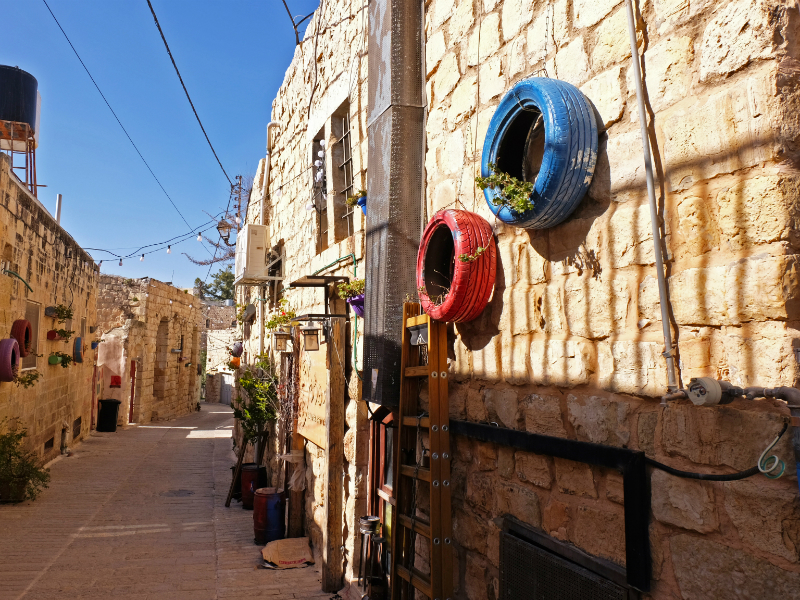My Israeli uncle was driving us to the Rishon LeZion bus station, where my wife and I would board a bus to Jerusalem en route to Ramallah in the West Bank, when he finally addressed our impending trip into Arab territory.
“I do not recommend it,” he flatly stated, staring ahead at the road. “At all.”
The response is common among Israelis, who haven’t been allowed in major Palestinian-controlled cities since 2000. But my wife and I weren’t interested in the politics of the place – we just wanted to see it. As an editor at The CJN, I felt I had some implied obligation, an unspoken urge to meet some of the people caught in the middle of a conflict that we, as Canadian Jews, so often talk about.
Our base was a guesthouse run by the Khouriya family in Jifna, seven kilometres north of Ramallah. Theirs is a Christian home, guarded by a tall gate and three wooden crucifixes on the kitchen table.
Rawda, the matriarch, was preparing a tagine when we arrived, chopping skinned potatoes into a large plastic bowl. The domestic life is relatively new for her. She used to travel the world as a social worker, speaking at conferences for the rights of women and the disabled. The work would exhaust any mother, but as a Palestinian, she needed to jump through added bureaucratic hoops to secure exit papers and account for extra travel days, flying in and out of Amman’s airport.
Issa, her husband, was getting older, and his years as a construction contractor began taking their toll. In 2009, the Khouriyas agreed to open their house as a B&B.
Their goal is more cultural than political, less about converting guests to pro-Palestinian advocacy than chatting over pots of fresh sage tea. When I told them I wanted to write an apolitical travel story, Issa chuckled. “I think everywhere you go, they will talk politics, because this is our life.”

He nonetheless suggested we visit Rawabi, the West Bank’s new, eerily dystopian skeleton of a yet-unfinished, purpose-built city. It’s unlike anywhere else in the West Bank: tall tan highrises shoot up in geometric circles like a mirage in the desert, delivering pristine views to a potential population of 40,000.
I say potential because, right now, only around 3,000 people live there. That hasn’t stopped the outdoor shopping mall, packed with high-end brands including Swarovski and Steve Madden, from hiring cashiers to occupy mostly vacant stores and cleaners to mop floors and wash windows. It is a hopeful capitalist enterprise rooted in fervent optimism.
READ: IN ALASKA, A JEWISH MUSEUM SURVIVES AGAINST THE ODDS
Afterwards, we visited Birzeit, a university town next to Jifna. Its ancient-feeling downtown, a cluster of narrow Jerusalem-stone alleys, is kept fresh with colourfully-painted tires, repurposed as plant pots, dangling from the walls.
We walked to a mom-and-son restaurant called Falafel Republic for lunch, which served up – I say this with apologies to Israelis everywhere – the best falafel I’ve ever eaten, with a perfectly crisped exterior and spicy, verdant filling.
The menu isn’t in English, so the son, Peter, simply asked us, “What do you like to eat? Some vegetables? Tomato? Eggplant?” Sure, we replied, all that sounds good. Twenty minutes later, Peter returned with a steaming bowl of spicy tomato sauce, beautifully plated hummus and a rich medley of eggplant, potato, cilantro and tahini.
I paired the meal with a blond ale from Shepherds Beer, brewed a few blocks down the road. The brewery was our next stop. (There are a handful of breweries in the Christian regions here. The biggest one, Taybeh, struck me more as the Molson Canadian of the West Bank, a mediocre and popular light beer. Shepherds’ stuff is seriously good by international standards.)

Khalid Sayej took us on a tour of the brewery. He’s one of three brothers who, along with their late father, founded the company in 2013, relying on a tremendous amount of loans. The bottling machine alone cost 600,000 euros. Even importing empty beer bottles from Turkey – because where else could they find 72,000 empties in a mostly Muslim region with limited recycling infrastructure? – takes an extra two weeks getting through the Israeli port authority.
The brothers are determined to make it work. When I asked why, Sayej’s response was almost absurdly simple: “We love beer.” When I asked if they ever considered setting up shop in a friendlier economy, he made clear their goal was to create opportunities for Palestinians. They don’t rely on government support, nor are they distressed by Israeli bureaucratic headaches. They steamroll ahead with innovative solutions and a dream, like any good capitalist enterprise.
In fact, Sayej laments how little Birzeit’s municipal government does to promote local tourism. He gestured outside to the heaps of trash and sideways dumpsters lining the dusty streets. Harsh winds wail against half-constructed houses dotting the roadside.
But it’s unfair to blame the government alone for the region’s poor tourist infrastructure. The Khouriyas noticed a significant drop in West Bank tourism since the 2014 Gaza War, even though Gaza is more than 100 kilometres away. Internationally, as in
Israel, many lump together and avoid all Palestinian areas as equally lethal.

Issa resents this, but he’s long stopped believing a solution will be found in his lifetime. While driving us down a curvy highway, he barely blinked when I asked about the possibility of peace.
“There’s no hope,” he replied curtly, staring straight ahead. “Nothing. From both sides. Nobody is looking for real peace.” In that moment, I recognized the conviction of my Israeli uncle. The two men will probably never meet, but if they did, I think they’d get along.
